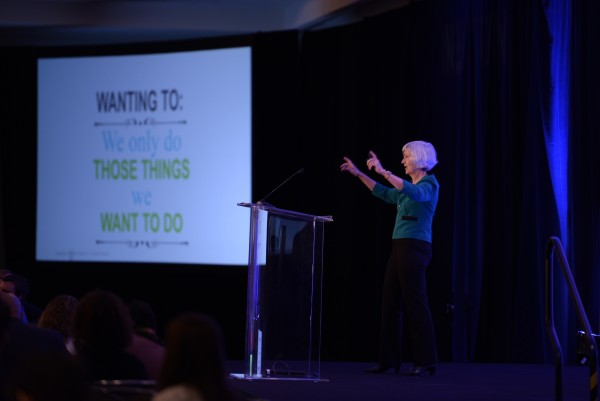People are constantly innovating and adopting new ways of business, collecting data, communicating and interacting. In this fast-paced world, learning is the key capability for the 21st century. “The world is changing faster than any time in human history,” said Erika Andersen, founding partner of the training consulting firm Proteus and author of the book Be Bad First: Get Good at Things Fast to Stay Ready for the Future.
In Be Bad First, the opening keynote speech at the Next Generation of Government Training Summit, Andersen explained that you can drive change for yourself and for the world if you get good at acquiring new skills. The key, she argues, is adopting the right strategies for high payoff learning.
Humans love to be good at things, and as a result, people are naturally driven to master tasks. Unfortunately, getting good at something requires a lot of work—a process that most people do not enjoy. In particular, the early stages of learning can be especially uncomfortable. But, Andersen explained, you have to get good at being a novice in a constantly changing world.
To crack the learning code, people must master four mental skills:
- Aspiration
We often talk about skills we’d like to master, or new things we’d like to try, but often we fail to take action to make it a reality. The problem, said Andersen, is that we only do the things we actually want to do. If casually talking about your goal hasn’t led you to take action, you haven’t tapped into your aspirations.
To trigger aspiration, the first step is to find the benefits that are personally motivating to you. Rather than focusing on the conventional reasons to learn a skill, concentrate on the advantages that are truly meaningful to you. Then, focus on those reasons, and envision your future. If this process is still not enough to convince you to ramp up your learning efforts, the benefit you are focusing on may not be motivating enough.
- Neutral Self Awareness
Without the right mindset, it can be difficult to open up to learning. One key aspect of our mindset, according to Andersen, is how we view ourselves. If people are not honest about their actual skill level, feedback and advice on how to improve will bounce off.
To avoid this pitfall, we should strive to become fair witnesses like those in the book Stranger in a Strange Land by Robert Heinlein. The key is speaking truthfully from our direct experience. “Our self awareness lives in how we talk to ourselves about ourselves,” Andersen said. Every time talk about ourselves, both outwardly to other people and in our inner monologues, is an opportunity to ask, “is this accurate?”
- Endless Curiosity
Young children are filled with questions, and show no sheepishness about their lack of knowledge about new things. Unfortunately, this curiosity is often socialized out of us as we grow older. We become less willing to understand and master new skills, even if we find them interesting and desirable.
To reengage our natural curiosity, the first step is to find your own curiosity “sparks.” These experiences, often built around hobbies, should be something you find engaging and that you want to know more about. The next step is to fan the flames with self-talk and action. Andersen recommends asking yourself why and how things work the way they do in order to promote an inquisitive nature. Finally, feed the fire of curiosity daily by repeating these steps actively and regularly.
- Willingness to Be Bad First
When trying something new, it can be easy to fall prey to negative self-perceptions. This can be especially true when trying something new in public or at work where fears of embarrassment can be paralyzing. This fear of being a novice is really a fear of being bad, and too often it keeps people from trying a new skill at all.
To embrace your novice status, and learn to be bad, Andersen explained the importance of effective self-talk. First, you should admit and recognize that you aren’t good at the new task. Second, you should remind yourself that you can get better. By accepting that you aren’t good, believing in your ability to learn and focusing on the bridge between your current abilities and the new ones, it is much easier to open yourself up to being a novice.
Mastering these skills will leave you positioned to thrive through and drive change. By focusing on these strategies, and adopting a mindset that you’re still learning, your personal growth is sure to keep pace with the fast changing world.
This blog post is a recap of a session that took place at the recent Next Generation of Government Summit. Want to see more great insights that came out of NextGen? Head here.





Leave a Reply
You must be logged in to post a comment.